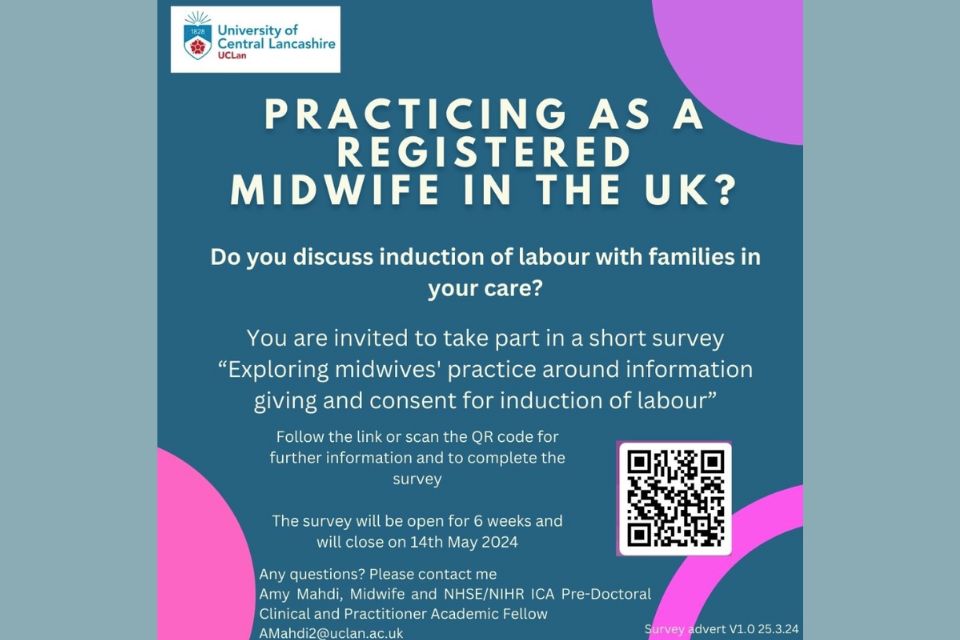As the rates of induction of labour are continuing to rise globally more evidence is required on the role of the midwife in providing information for appropriate consent. Amy Mahdi, research midwife, Liverpool Women’s hospital, Liverpool describes the background to a new study and invites us to contribute.
_______________________________
The rate of induction of labour (IOL) in the UK has risen over the last 10 years reaching
around 33% for 2022-23 (NHS England, 2023), increased from 22% in 2012-13. Although it is often recommended in complicated pregnancy with the intention of avoiding poor neonatal and maternal outcomes, it is not undertaken without risk and the potential to lead to further interventions (Coates, Goodfellow and Sinclair, 2020). Despite the high rates of IOL in the UK women and birthing people consistently report feeling unprepared for the IOL process, and that they were not aware of the risks and benefits associated with IOL (Patient Information Forum, 2021). Evidence also suggests that women are not aware that IOL is a recommendation and not a requirement and are not informed that alternatives are available (Coates et al, 2021).
It is within the remit of midwifery practice to discuss plans for IOL with women when spontaneous labour has not occurred by 41 weeks, in line with NICE recommendations (NICE, 2021). It is therefore the responsibility of the midwife to provide sufficient information regarding the benefits, risks, and alternatives to IOL, personalised to the circumstances of the individual, to enable women to make an informed decision about whether to proceed with IOL. By doing so, women are more likely to feel in control of the decisions made about their plans for birth and be less likely to experience a large gap between their expectations and birth experience. Perception of birth experience plays a critical role in the mother-infant relationship and maternal wellbeing during the postnatal period and beyond (Webb et al, 2021).
There is wide variation in the information sources and resources that women have access to around IOL, with 50% of respondents to a recent UK survey reporting having only received information verbally from health professionals (Patient Information Forum, 2021). This variation in practice is likely to lead to inequity in the breadth and depth of information that women receive regarding IOL, and the ability to make informed decisions around care and subsequent perceptions of birth.
The aim of this project is to survey the current practice of UK midwives around the provision of information and consent for induction of labour, via social media. This work will inform the development of a Doctoral proposal looking to improve women’s understanding and experiences of IOL. The findings will also add to the knowledge base around this topic and will be submitted for publication in a peer reviewed journal and at academic conferences.
The objectives of this study are:
- To explore what midwives consider important topics to cover when discussing IOL
- To discover the range of resources used to provide information to women about IOL.
- To find what approaches midwives feel works best and gather feedback on self-identified areas for improvement including training needs and confidence.
- To establish how discussions and consent are currently documented and identify any tools or resources currently in use by midwifery staff.
- To identify areas for service development and improvement in relation to IOL information giving and consent.
If you are a midwife currently working in any area of practice across the UK who discusses IOL with women in your care, please consider completing the survey via the link below
forms.office.com/e/B6yx28JfUy
The survey will be open until 14th May 2024 and estimated completion time is 10-15 minutes.
If you have any questions or comments on this survey, please contact Amy Mahdi at AMahdi2@uclan.ac.uk
References
Coates, D., Donnolley, N., Foureur, M. and Henry, A (2021) Women’s experiences of decision making and attitudes in relation to induction of labour: a survey study. Women and Birth: journal of the Australian College of Midwives, 34(2), e170-e177. https://doi.org/10.1016/j.wombi.2020.02.020
Coates, D., Goodfellow, A., & Sinclair, L. (2020). Induction of labour: Experiences of care and decision-making of women and clinicians. Women and birth : journal of the Australian College of Midwives, 33(1), e1–e14. https://doi.org/10.1016/j.wombi.2019.06.002
National Institute for Health and Care Excellence (NICE) (2021) Inducing Labour. [Online] https://www.nice.org.uk/guidance/ng207
NHS England (2023) NHS Maternity Statistics, 2022-23 [Data set] https://digital.nhs.uk/data-and-information/publications/statistical/nhs-maternity-statistics/2022-23
Patient Information Forum (2021) Maternity Decisions: Induction Survey – Executive summary. https://pifonline.org.uk/download/file/678/
Webb, R., Ayers, S., Bogaerts, A. et al. When birth is not as expected: a systematic review of the impact of a mismatch between expectations and experiences. BMC Pregnancy Childbirth 21, 475 (2021). https://doi.org/10.1186/s12884-021-03898-z
April 2024
Amy Mahdi
Research Midwife, Liverpool Women’s Hospital, Liverpool


